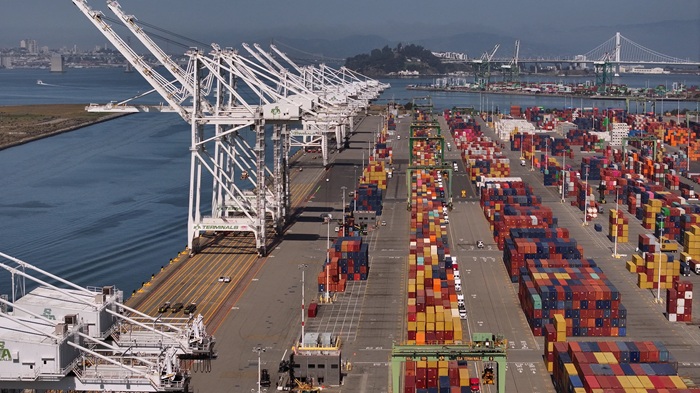
A federal appeals court has paused Wednesday night’s ruling from the Court of International Trade that blocked President Donald Trump’s tariffs.
The United States Court of Appeals for the Federal Circuit’s ruling restores Trump’s ability to levy tariffs using the emergency powers he declared earlier this year. The appeals court also ordered that both sides provide written arguments on the question of the blocking of Trump’s tariffs, to be filed by early next month.
The pause adds to the confusion and uncertainty swirling around Trump’s tariffs, which have been a key pillar of his economic policy.
The Court of International Trade ruled Wednesday that Trump did not have the authority under the International Emergency Economic Powers Act to impose sweeping tariffs.
The Trump administration immediately appealed the decision, setting the course for a legal battle over the economic policy that Trump promises will re-focus the American economy on manufacturing but that could raise prices for small businesses and consumers.
The pause from the appeals court came less than 24 hours later.
In a lengthy post on his Truth Social platform Thursday evening, Trump argued the CIT decision undermines presidential power, claiming it would force the president to get Congressional approval for his reciprocal tariffs. The president also called on the Supreme Court to step in and reverse the CIT decision.
Peter Navarro, Trump’s top trade adviser, told reporters that while the pause was not a surprise, the administration is pursuing “all strategic options.”
The two rulings – halting the tariffs, then staying that decision – came in under 24 hours, a whirlwind that adds to the chaos around Trump’s economic policy.
On Wednesday evening, the USCIT judges blocked all tariffs invoked under IEEPA – the “Liberation Day” tariffs Trump announced on April 2 and also the tariffs placed earlier this year against China, Mexico and Canada, designed to combat fentanyl coming into the United States. Notably, the order does not include the 25% tariffs on autos, auto parts, steel or aluminum, which were under a different law, Section 232 of the Trade Expansion Act.
USCIT unanimously came to a summary judgement on two separate cases in one opinion. One was a lawsuit was filed in April by the Liberty Justice Center, a libertarian legal advocacy group representing wine-seller VOS Selections and four other small businesses. The other was filed by twelve Democratic states brought against the government over tariffs. The court also ordered a window of 10 calendar days for the administration to roll back the tariffs in question.
The Trump administration appealed that same day, just hours after the decision. On Thursday, the administration threatened to take the case to the Supreme Court if it was not granted a stay by either the appeals court or the USCIT.
And at a press briefing early Thursday afternoon, White House press secretary Karoline Leavitt lambased the CIT’s decision, calling the three-judge panel “activist judges,” though it includes a judge appointed by Trump during his first term. The CIT’s ruling, she said, was an effort to “brazenly (abuse) their judicial power to usurp Trump’s authority.”
The appeals court granted the stay later on Thursday afternoon, setting a deadline of June 5 for the plaintiffs to respond and June 9 for the government to reply. (CNN)
